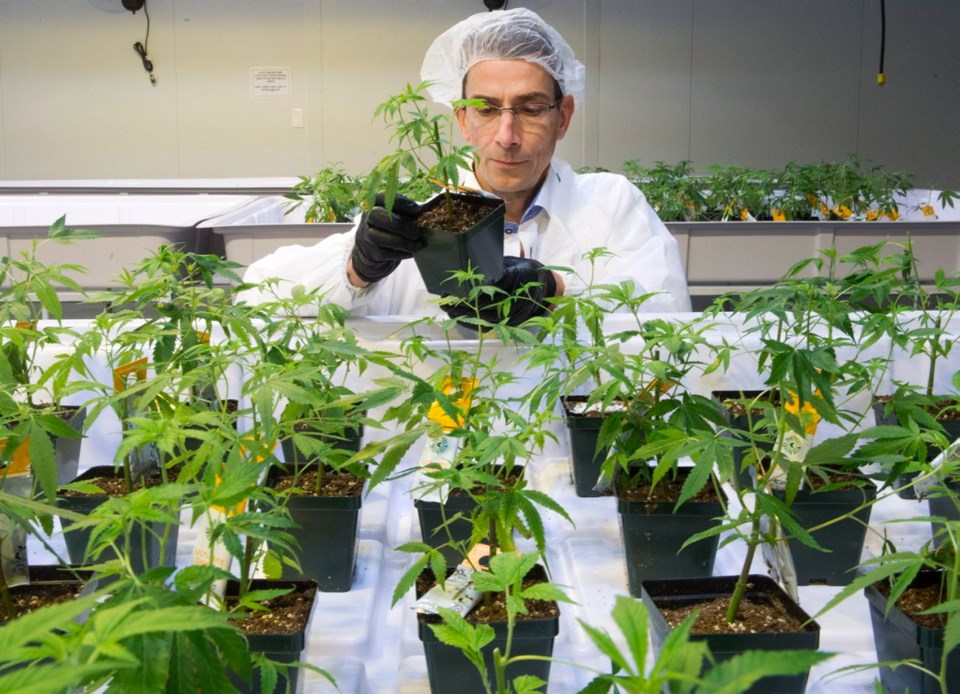 There was a captivating point made during the consultations on how recreational marijuana should be retailed in B.C. once it’s legal next July.
There was a captivating point made during the consultations on how recreational marijuana should be retailed in B.C. once it’s legal next July.
The B.C. Government Employees Union and an association of private liquor stores are both keenly interested in shunting all those dispensaries off to the sidelines and snagging monopoly rights to sell marijuana. The union wants the jobs, and the association wants the business. They made their pitch to government under the banner of the “Responsible Marijuana Retail Alliance of B.C.”
One of the countless arguments raging as the clock ticks toward opening day is whether selling alcohol and marijuana side-by-side is a good idea. The alliance, no surprise, says it’s not a problem.
“Vegetarians regularly shop in grocery stores where meat is sold without accusation of a risk of becoming carnivorous.”
So if carnivores and vegetarians can co-exist peacefully in the same retail environment, there’s no reason why the scotch-on-the-rocks crowd can’t make room for the pot-heads in B.C.’s public and private liquor stores. It’s tempting to endorse that idea, just for the Cheech and Chong parodies it would inspire.
The government released a report on the consultations Tuesday while announcing the first few of many decisions to come on what the new world is going to look like.
The minimum age is set at 19, the retail network will be both public and private (but not necessarily liquor stores) and the wholesale distribution will be government-run.
The last item confirms the obvious point that it’s the B.C. government that will be setting the price for marijuana. The federal government will license suppliers, and they will sell to the Liquor Distribution Branch, or some offshoot of that agency. It will supply all the retail shops, whatever form they take.
If the market is anywhere near as big as expected, that is a sizable new function that government has just taken on. Particularly since Public Safety Minister Mike Farnworth said Tuesday he doesn’t anticipate that marijuana will be routed through the same warehouses used for liquor.
He said they’re different products that need different handling. The LDB has long experience with the logistics of handling controlled substances, so it gets the new responsibility. But it will be run as a separate business line, which is likely going to involve significant start-up costs.
Which raises the universally acknowledged point: Legalized marijuana is not going to be the windfall that some might have expected.
Farnworth reiterated it again: Anyone approaching the issue from the idea of how much new money it’s going to bring in is “making a huge mistake.”
Apart from building a new warehouse system in the next seven months, there’s also the matter of beefing up police enforcement, and spending more on public education.
And they can’t just set a price high enough the recoup all those costs. It has to be held low enough to accomplish the main goal of the whole venture, which is to snuff out the black market. The tax rate that will determine that hasn’t been set yet, nor has the federal-provincial revenue-sharing deal.
Ottawa originally suggested 50-50, but is expected to tilt that in favour of the provinces, although it all has to be worked out, with local-government needs included in any arrangement. As many as 18 laws have to be amended during the spring sitting of the legislature to set the stage.
As all the details are worked out, the consultation summary gives a glimpse of how respondents feel about it all. Most of the 48,000 people who took part don’t use marijuana, but support legalization. They’re open to the idea of legalizing tasting lounges or cannabis cafés and allowing use outside the home, but second-hand smoke is a significant concern.
The unique issue that B.C. faces is the entrenched underground market that’s thrived for decades and is far more sophisticated than elsewhere in the country. The new regime will either challenge it directly, or co-opt it. Some people are looking forward to growers going legal, paying taxes and “contributing openly in their communities.”
A vision was presented of small, craft cannabis producers, certified like VQA wineries, capitalizing on the established “B.C. bud” brand.
They’ve got seven months to get it started.



